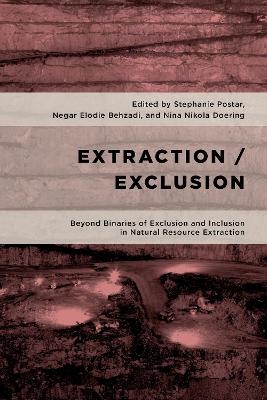
Extraction/Exclusion
Rowman & Littlefield International (Verlag)
978-1-78661-536-7 (ISBN)
Extraction/Exclusion critiques the idea of inclusion as the solution to exclusion in contemporary resource extraction. Drawing on scholarship from across the social sciences, empirical chapters in this collection show that extraction is predicated on exclusions. Extraction/Exclusion portrays how inclusionary language and practices often result in further exclusions, concealing unchanged systems of domination and dispossession, and reproducing violent exploitative processes on the ground.
Stephanie Postar is an environmental anthropologist specializing in energy and natural resources in the Global South. Her research engages with the politics and practices that shape decisions about and attitudes toward natural resource use and management in Tanzania. Stephanie holds a doctorate in Social Anthropology from the University of Oxford. She is a British Academy Postdoctoral Fellow at the London School of Economics and Political Science and previously was a Ciriacy-Wantrup Postdoctoral Fellow in Natural Resource Economics and Political Economy at the University of California, Berkeley. Negar Elodie Behzadi is a lecturer in Human Geography at the University of Bristol. She holds a doctorate in Human Geography from the University of Oxford, and a Masters in Environment and Development from King’s College London. Negar is a feminist political geographer and political ecologist whose work focuses on how intersectional forms of exclusion and marginalization are produced, reproduced and contested in stressed environments. Her research brings the insights of feminist geography and the sensibilities of an ethnographer to issues related to resource extraction in Tajikistan (Central Asia) and Iranian migrants in France. Negar has also co-directed two ethnographic films, and her work uses creative practice and methods. Nina Nikola Doering holds an Mphil in Development Studies and a DPhil in Geography from the University of Oxford. Her research has engaged with public participation and decision-making in extractive resource management in Greenland. More recently, she has focused on knowledge co-creation, research ethics, Indigenous rights, and decolonization. Nina works as research group leader of the Arctic Governance research group at the Institute for Advanced Sustainability Studies e.V. (IASS) in Potsdam, Germany.
Introduction: Challenging Inclusion as a Solution to Exclusion in Natural Resource Extraction (by Negar Elodie Behzadi, Stephanie Postar, and Nina Nikola Doering)
Part I: Haves/Have Nots: Unsettling the Political Ecologies of Extraction (by Philippe Le Billon, Stephanie Postar, and Negar Elodie Behzadi)
Chapter 1: Managing Gold Extraction Through Technocratic Discourse in Post-Socialist Kyrgyzstan (by Asel Doolotkeldieva)
Chapter 2: A Political Ecology of Environmental Law Enforcement: Civil Complaints and Environmental Justice in Post-Neoliberal Ecuador (by Teresa Bornschlegl)
Part II: Oppressors/Oppressed: Gender, Race, and the Extractive Body (by Rebecca Elmhirst)
Chapter 3: A Decolonial Feminist Dialogue-As-Critique: Against the Sexual and Racialised Violence at the Heart of Extractivism (by Amber Murrey and Sharlene Mollett)
Chapter 4: Young Female Miners in Tajikistani Coal Mines: Intersectional Extractive Violence and Ecologies of Exhaustion (by Negar Elodie Behzadi)
Part III: Human/Non-Human: The More Than Human (by Emilie Cameron)
Chapter 5: Extractive Industries, Impact Assessments, and Exclusion in Northwest Greenland (by Mark Nuttall)
Chapter 6: Intimate Encounters with Uranium at an Anticipated Uranium Mine in Tanzania (by Stephanie Postar)
Part IV: Static Materials/Dynamic Materials: Resource Materialities, Temporalities, and Affect (by Gisa Weszkalnys)
Chapter 7: Contested Futures in British Columbia’s Hydro-Extractive Corridor: Progress, Pragmatism, and Visionary Activism (by Anna J. Willow)
Chapter 8: Zinc’s Time in the Sun? Tracing the Reopening of the Riso and Parina Valleys’ Mines from Precarious Optimisms to Affective Indeterminacy (by Robin West and Isabel Crowhurst)
Part V: Large-Scale/Small-Scale: Artisanal and Small-Scale Mining (by Kuntala Lahiri-Dutt)
Chapter 9: Artisanal and Large-Scale Mine Relations: Laying the Groundwork for Autonomous Coexistence in Sub-Saharan Africa (by Gavin Hilson, John Owen, Titus Sauerwein, Massaran Traore, and Éléonore Lèbre)
Chapter 10: Negotiating Inclusion and Exclusion in Artisanal Oil Extraction: The Case of Two Villages in East Java, Indonesia (by Nanang Kuniawan, Päivi Lujala, and Ståle Angen Rye)
Part VI: Inclusion/Exclusion: Precarious Resource Inclusions (by Penda Diallo)
Chapter 11: Contractual Violence: Impact-Benefit Agreements and the Violent Exclusions Hidden by “Consent” (by Leah S. Horowitz)
Chapter 12: In the Ebbs and Flows of Resource Extraction, Who Is a Stakeholder? Insights from West Kalaallit Nunaat (Greenland) (by Nina Nikola Doering)
Conclusion: Extractive Orientations (by Gavin Bridge)
About the Authors
| Erscheinungsdatum | 25.11.2023 |
|---|---|
| Reihe/Serie | Geopolitical Bodies, Material Worlds |
| Verlagsort | London |
| Sprache | englisch |
| Maße | 159 x 237 mm |
| Gewicht | 671 g |
| Themenwelt | Naturwissenschaften ► Geowissenschaften ► Geografie / Kartografie |
| Sozialwissenschaften ► Ethnologie | |
| Sozialwissenschaften ► Soziologie | |
| ISBN-10 | 1-78661-536-3 / 1786615363 |
| ISBN-13 | 978-1-78661-536-7 / 9781786615367 |
| Zustand | Neuware |
| Haben Sie eine Frage zum Produkt? |
aus dem Bereich


